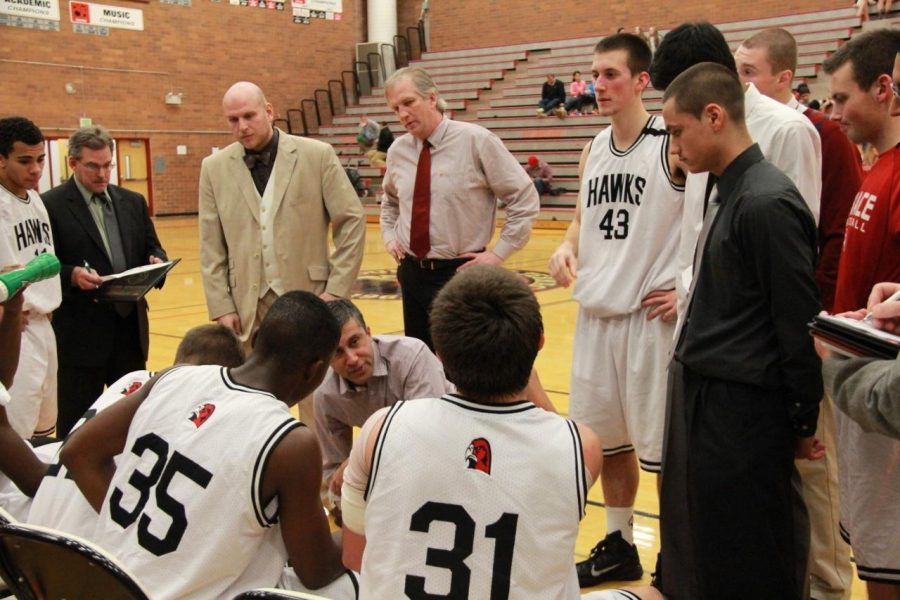Imagine you are in Rome, standing nearby as a man reads out of his Rick Steves’ Italy Travel guide and attempts to describe the significance of a monument to his family while pointing at the wrong one.
You intervene and point out that he’s actually looking at a different monument, but before he can get flustered you strike up a conversation with the family and begin to discuss ancient Rome. They are fascinated by your wealth of knowledge and before you know it, you have walked the length of the plaza with them and explained each art and architectural piece along the way.
This was common practice for history teacher Adam Bazant when he lived in Rome. A couple of days each week, he would accidentally become someone’s free tour guide for the day.
“I like people to know and appreciate what’s in front of them,” Bazant said. “It’s definitely cool to look at something and know the context under which this thing was created and just appreciate it for what it is. Us human beings, we created this.”
Bazant’s dual passions for history and teaching are what brought him to MTHS, where he has channeled his passion into an enthusiastic classroom demeanor as he walks his students through world history.
Family background
While Bazant was born in Tacoma, his family originally lived in Poland and immigrated to the United States nine months before Bazant was born.
When the Polish Solidarity movement emerged in the 1980s to fight communism, more than 90 percent of Poland joined this underground, peaceful uprising to overthrow the government. While Bazant’s family still lived in Poland, his father was heavily involved in the movement and served as vice president of the electrical and railroad unions.
In 1982, when Solidarity became a threat to communism and Russian influence in Poland, the communists declared martial law and, over the course of a couple of days, imprisoned all of the Solidarity leaders. Bazant’s father was caught on the second night of Martial law and put into prison for about a year.
“That man is incredible. Just to imagine what he went through in a communist prison. They’ve got stories of the secret police quite literally setting my dad up to kill him,” Bazant said.
When martial law was lifted, his father was released, but he was blacklisted, meaning he couldn’t work and was ostracized from the community. He was given a one-way visa out of the country, as were many other ex-prisoners, in a communist attempt to get all solidarity leaders out.
So, in March of 1983, Bazant’s father, mother and two brothers made their way to Tacoma. His father only had $10 to his name and neither of his parents could speak English, so his family relied on welfare to keep them afloat for a couple of years.
“Picture it: my mom was 21 years old when this happened. . . Imagine getting thrown into prison and kicked out of your country and moving somewhere where you have no idea [of] the culture, the language, the religion, nothing,” Bazant said.
Bazant’s father eventually landed a job in the Red Lion Hotels concierge department until it went out of business and was sold.
He spent one night and two days waiting in line at a job fair for an interview, and out of that he was hired at the Scott Paper Company in Everett, which was the world’s leading manufacturer of paper tissue products before it was acquired by the Kimberly-Clark Corporation.
Bazant’s father moved his family up to Snohomish and bought a house in 1989. He retired with Kimberly-Clark in 2012, only two years before they went out of business.
Bazant said his father impacted him immensely.
“He’s the most selfless man I’ve ever met in my life. Quite literally, he will wear one pair of shoes for 10 years and give us everything he has. It’s incredible to see that work ethic, that level of individualism, just complete sacrifice and selflessness for those that you love. It’s quite inspiring and that work ethic was instilled in me,” Bazant said. “Appreciating the sacrifices he made for me and my brothers, I don’t want to let him down. I owe everything to that man.”
Due to his family’s heritage, Bazant’s first language is Polish and his family still holds onto all of their Polish customs. Bazant’s family couldn’t return to Poland until after 1989, but in 1994 they went back for about a month, “meeting the old world.”
World traveler
Bazant lived in and traveled Europe intermittently between 2005 and 2007, adding up to about a year overall. He mainly lived in Rome but also spent time in France, Germany, Poland and the Czech Republic. Bazant was in Europe to study abroad and to travel for the sake of traveling. He studied the French Revolution in Paris and learned to speak Italian in Italy, and otherwise traveled independently.
“I’ve always loved history, but to experience it, to see it, to live it, I mean it’s definitely something that’s unforgettable,” Bazant said.
While living in Rome, he had an apartment about a block away from Vatican City. He also spent time living in the EUR district outside the walls of Rome.
“I wanted to emulate as much as possible being a Roman, living in Italy and just experiencing it. Not being a tourist, but being an Italian,” he said.
Bazant said often went to the Roman Forum, a plaza at the center of the city which features the ruins of government buildings from ancient Rome.
“I spent a lot of time in the forum on my own just studying the pieces, studying the architecture and just visualizing. I was standing in the capital of the greatest empire in the history of the world up until this point,” Bazant said. “I was standing in the capital. I stood where the caesar would announce to the people and I saw where the caesars would sleep, and just being a part of that, it’s incredible.”
Spending so much time in the forum is how he ended up serving as a tour guide.
These tours often started by accident, just by talking to other people in the forum.
Bazant would walk them through the forum and then, if the tourists wanted, they could pay his way and have him accompany them into the Palatine Hill, one of the most ancient parts of the city. This included a number of ancient sites, including the Colosseum and the Pantheon.
He tended to top off the tours with his favorite gelato spot. Sometimes he redirected his impromptu pupils to some of the less touristy areas to set them up with a more authentic Roman dinner, and then would be on his way.
While Bazant didn’t pursue teaching as a career immediately after his time spent in Italy, he said giving tours fed his passion for teaching.
“I don’t know if [giving tours] propelled me into teaching, but it definitely solidified that I loved doing this,” he said.
Businessman turned teacher
Bazant’s life career has not always been centered on teaching. In fact, he has only been a teacher for the past three years, despite the fact that he graduated college nearly nine years ago in 2007.
After graduating from Snohomish High School in 2002, Bazant went straight to the University of Washington. When he earned his bachelor’s degree in history, Bazant wasn’t sure what he wanted to do and didn’t even consider teaching as a profession.
Whatever job he got out of college, he “was going to make a lot of money doing it.” Thus Bazant was dissuaded from pursuing teaching as a career due to the perceived low salary that educators make.
“The problem is, when you’re in high school, you don’t know what a lot of money is. Naturally, you have these preconceived notions in your head of what you should be making out of college. My notions were, ‘I should be making six figures. Easily,’” Bazant said.
Knowing he couldn’t make that much starting out in a teaching profession, Bazant primarily worked in sales. He initially started working an inside software sales job in downtown Seattle, which consisted of selling software to small and large businesses. He did this for about six months before he got a job as a financial services advisor, which he enjoyed because it allowed him to educate others on something he loved: financing.
“Financial services, you’re working with people, you’re educating them, you’re coming up with a plan to enrich and better their lives,” Bazant said.
He entered the market at the wrong time and was only in this industry for two years before it fell through and he had to rethink his career options.
From there he got into a job selling advertisements. He called 100 businesses a day, reciting the same script over and over again.
“It was a nightmare. I felt that my intelligence was waning every single day, that I wasn’t bettering myself as a human being,” Bazant said. “I wasn’t exploiting what really made me happy, which is, I love history. I genuinely love history and I genuinely love teaching. It just kind of took experiencing life without that to really get back to it and figure myself out.”
In January 2011, Bazant made a decision. He applied to the police academy and he applied to graduate school, ready to take either option.
Graduate school won out, and soon enough, Bazant decided to pursue a career as a teacher.
After graduate school, Bazant was able to get his first true teaching job. To start, he taught part-time at Meadowdale Middle School in the 2013-14 school year.
That same year, there was an opening at MTHS for a World History 9 class first period, second semester, according to Principal Greg Schwab. Schwab reached out to the other principals in the district to find a part-time teacher who could fill the opening and the Meadowdale Middle School principal recommended Bazant. So, Schwab hired him to fill the role.
“In my one semester here two years ago, [MTHS] was just stunning,” Bazant said. “The social studies department, [Michole] Mattix, [Chris] Ellinger, [Erin] Grambush, they just kind of created an environment that’s extremely welcoming and are people that I enjoy.”
However, Bazant was on a noncontinuing contract, which ended at the end of the school year and he got a job at Skyline High School in the Issaquah School District, on yet another noncontinuing contract.
Schwab stayed in contact with Bazant during this time.
“There was something about him that was like, ‘I need to keep in touch with this guy. I need to keep him around in the event that there’s another opening later on, because I think he’s a guy that we’re going to want to have,’” Schwab said.
So, when there was an opening in the MTHS staff this year, Schwab told Bazant that he would love it if he applied for it. Bazant had to do a formal interview with a committee consisting of Schwab and a few history department teachers.
“Everybody just loved him and it was just really clear that this was the guy we needed to hire,” Schwab said. “More than anything else, what struck us about him was just the enthusiasm and the passion that he brought to the interview and that he’s brought to his teaching here.”
Bazant was hired back to MTHS full time this year on another noncontinuing contract, but a midyear resignation allowed Schwab to put Bazant on a continuing contract.
“I’m just thrilled to have him here. He’s done such a great job this year and he’s a real positive addition to the staff,” Schwab said.
When the women’s JV soccer coach had to resign due to family health reasons near the beginning of the season, Schwab said he asked Bazant if he would take the coaching job.
Bazant replied, “Well, I have a Sounders jersey, does that count?” Still, Bazant filled the coaching role and, according to Schwab, did a really outstanding job.
“He wants to help out wherever he can help out and he’s just energetic and enthusiastic and I think he fits in really well here with the other teachers that we have on our staff,” Schwab said.
Energizing the classroom
Above all, it is obvious by the manner in which he talks about his work that Bazant is exhilarated by his ability to, as a teacher, simultaneously be an instructor and a historian.
“This is my castle. I get to present the history the way that I understand the history, the way that I want you guys to see the history. My job is to be a historian and then to pass that knowledge on to my students and inspire them and hopefully get people to enjoy history and appreciate life and where we’re at today because it’s all a consequence of what we experienced in the past,” Bazant said.
Schwab noted that Bazant’s passion for history and teaching translate into a level of enthusiasm in his classroom.
“He’s incredibly knowledgeable on his content. I mean, he’s a self-described history nerd. He loves what he teaches. The other thing is that intangible quality, just the energy and enthusiasm that he brings to the position and the passion that he brings to teaching,” Schwab said. “I think the students that have been in his classes have really gotten a great experience because of it.”
Beyond his passion for history, Bazant loves being a teacher for the fulfillment it brings him.
“I’ve had students from Skyline last year shooting me emails, asking me how I’m doing, telling me how much they enjoyed my class, and that feels good. You can see the difference when those students come back,” he said.
In addition, he sees his role as something beyond just teaching history: he is setting up citizens in the process.
“We live in a pseudo democracy. We make decisions and we need to make educated decisions. So, that’s part of it too, I want to live in a society where we have a bunch of smart people that can make informed decisions, that know how to think, not just react, but know how to think, know how to ask questions, know how to look answers up beyond just Wikipedia,” Bazant said.
He said he attempts to do this by relating historical information back to what is happening in current times.
In addition, he employs various teaching styles to try to accommodate all students. His class structure includes lectures, primary source analysis, small group discussions of open ended questions, subsequent larger class discussions, coloring exercises and propaganda exercises, among other things.
“You just need to have a tool chest and you need to use all the tools that are available to you to try to reach everybody and then just encourage people,” Bazant said.
He especially emphasizes class discussions.
“History demands conversation. History demands controversy. Because there’s what happened, which nobody knows what happened exactly, even if you were there, and then you’ve got stories and interpretations of what happened. So it’s like a big mystery and our job is to figure out what happened, like detectives,” he said.
The end goal, of course, is to get students engaged in history
“There’s a handful of people that I can probably look at and say, ‘I haven’t gotten to those kids yet. They couldn’t care less about history, yet.’ But that’s the challenge. There are kids who are highly engaged and there are kids who aren’t there yet and my job is to get everybody engaged,” Bazant said.




